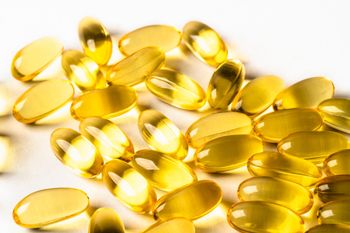
Supplements and Mental Acuity
Dietary supplements cannot improve memory or mental acuity, but several new products offer support for those hoping to keep their faculties sharp for years to come.
"When I was younger, I could remember anything, whether it had happened or not; but my faculties are decaying now, and soon I shall be so I cannot remember any but the things that never happened." -Mark Twain
Mark Twain's all-to-honest observation resonates with more people every year. The United States population's median age is the highest it's ever been, 35.3 years, and baby boomers will push it higher still. Boomers accounted for a 49% increase in the ranks of the 45- to 54-year-old group, according to the 2000 census. Meanwhile, the number of 18- to 34-year-olds decreased 4%.
Dietary supplements cannot improve memory or mental acuity, but several new products offer support for those hoping to keep their faculties sharp for years to come.
EPA AND DHA
Triomega softgels provide 800 mg of fish oil, including 500 mg of EPA and DHA.
Photo courtesy of Inverness Medical.
Clinical studies indicate omega-3 fatty acids may offer health benefits to the brain as well as the heart and joints. Fatty acids are selectively absorbed by the brain, and may perform a variety of functions, including the most essential of all, generating and conducting electrical potentials. Docosahexaenoic acid (DHA), an omega-3 fatty acid, is crucial to the brain, according to Martek Biosciences Corp. (Columbia, MD). DHA is found in tissues throughout the body but is also a major structural fatty acid in the gray matter of the brain. DHA is particularly important for proper brain and eye development in infants, according to Martek, and has been shown to support cardiovascular health in adults.
In March, Pronova Biocare (Lysaker, Norway) debuted Triomega in the United States. Some omega-3 supplements provide 300 mg of eicosapentaenoic acid (EPA) and DHA per softgel, requiring a dose of two or more softgels per day. Triomega provides 500 mg of EPA and DHA in a highly concentrated single daily softgel.
"American consumers demand quality products," says Egil Bodd, MD, PhD, the CEO of Pronova Biocare. "We recognize that safety, coupled with the convenience of a single daily dose, is the best way for us to help U.S. consumers achieve their health goals."
One Triomega softgel contains 800 mg of fish oil. Of the total, 500 mg are total EPA and DHA, approximately twice the concentration of some omega-3 supplements currently available in the United States.
Equally important, the EPA-to-DHA ratio is approximately 2:1, a balance that many experts believe is optimal for good health.
Triomega is packaged in both 30- and 60-count cartons in drug, food, and mass-market stores, and in 45- and 90-count bottles in health-food outlets. The brand of omega-3 supplements is distributed by Inverness Medical (Waltham, MA).
The oil in Triomega is produced using a proprietary purification process that removes nonessential oils and results in a higher concentration of omega-3s. The process also removes the impurities and contaminants found in fatty fish.
Recognizing that supplement labels confuse consumers, Triomega has designed the label and product packaging to clearly state the content of each softgel, including the percentage of the most important components, EPA and DHA.
"While evidence of an array of health benefits continues to emerge, research has demonstrated the positive effects of omega-3s on the heart, mind, and joints," says Machelle Seibel, MD, medical director at Inverness Medical. "For people with a low consumption rate of fatty fish, taking a daily omega-3 supplement can provide vital benefits to overall health and well-being."
TOCOTRIENOL
Tocotrienol may play a role in protecting the brain from inducible neuronal cell death. The National Institute of Neurological Disorders and Stroke of the National Institutes of Health (Bethesda, MD) recently allocated more than $1 million to investigate the protective properties of tocotrienol after previous research determined that tocotrienol crosses the blood-brain barrier and may help protect neuron cells from damage from stroke or neurodegenerative diseases.
The research will be led by Chandan K. Sen, PhD, director of the laboratory of molecular medicine at Ohio State University Medical Center (Columbus, OH). Tocomin Full Spectrum Tocotrienol Complex from Carotech (Edison, NJ) will be used in the study.
Sen led an earlier study that showed nanomolar amounts of alpha-tocotrienol blocked glutamate-induced neuron death. Consistent with observations from HT4 neuron cells, nanomolar levels of tocotrienol significantly protected rat primary fetal cortical neurons.
BIOVINCA
Consumers consider some herbs to be safer than single-entity drugs. Fortunately, the recent string of bad press hasn't damaged the reputation of herbs, according to Gilbert Gluck, founder and CEO of Cyvex Nutrition (Irvine, CA). "We don't think that the negative publicity on supplements is affecting consumption," he says. "The state of the economy may at times affect the supplement industry. Supplements are considered luxury items; hence, consumption is directly dependent on the state of the economy and disposable income."
Cyvex's entry in the mental acuity market is BioVinca, a product based on vincamine, an alkaloid found in periwinkle. "Consumer demand for BioVinca has steadily increased due to demographics, stress, and busy life styles, and greater awareness of issues affecting diminished cognitive function," says Charlene Lee, director of marketing and sales.
"As a true nootropic, the effects of BioVinca are confined to the brain, which is unique, and toxicity is very low," says Gluck. "Research is always continuing on BioVinca and vinpocetine. The November/December 2003 issue of Nutrition, for example, included a study showing vinpocetine produced significantly more improvement than a placebo in performance on global cognitive tests reflecting attention, concentration, and memory."
CITICOLINE
During the SupplySide East show held in May in Baltimore, Alexander Schauss, director of natural and medicinal products research at the life sciences division of the American Institute for Biosocial and Medical Research Inc. (Puyallup, WA), said that citicoline, an endogenous molecule that is an obligatory intermediary for the synthesis of phosphatidylcholine and other major phospholipids in the plasma membrane component, has been shown to have tropic action at the membrane level and has been used to improve cognitive function in several brain syndromes.
"Scientific studies have indicated a positive effect with Alzheimer's and Parkinson's disease, as well as stroke recuperation," says Schauss.
Kyowa Hakko (New York City) sponsored Schauss and also supplied Cognizin-brand citicoline for his research. "As a dietary supplement, Cognizin could be used for the prevention and mitigation of neurodegenerative diseases as well as eye-health concerns such as amblyopia, glaucoma, and presbyopia," says Schauss.
Cognizin received the Nutracon NutrAward as the best new ingredient for 2003, and has been used internationally for its beneficial action toward neurodegenerative disorders associated with stroke, cerebrovascular pathology, brain aging, and head trauma.
Kyowa Hakko is currently developing new commercial production techniques of Cognizin using fermentation technology.
IRON
Iron may improve the attention, short-term memory, and performance of cognitive tasks of young women, according to researchers at Penn State University (University Park, PA). The study was the first to systematically examine the impact of iron supplementation on cognitive functioning in women aged 18–35.
In nonindustrialized countries, the prevalence of anemia is more than 40% for nonpregnant women and more than 50% for pregnant women and for children aged 5–14. According to current prevalence estimates, iron deficiency affects the lives of more than 2 billion people worldwide.
During the study, 149 women classified as either iron sufficient, iron deficient/anemic, or iron deficient/ not anemic, performed baseline cognition testing. The tests looked at memory, stimulus encoding, retrieval, and other measures of cognition.
The women were then given either 60-mg iron supplements (elemental iron) or placebo treatment for four months. At the end of that period, the 113 women remaining in the study performed the same task again.
On the baseline test, women who were iron deficient but not anemic completed the tasks in the same amount of time as iron-sufficient women of the same age. Anemic women performed significantly worse. What's more, the more anemic a woman was, the longer it took her to complete the tasks. However, supplementation and the subsequent increase in iron stores markedly improved cognition scores (memory, attention, and learning tasks) and time to complete the task.
Newsletter
From ingredient science to consumer trends, get the intel you need to stay competitive in the nutrition space—subscribe now to Nutritional Outlook.





